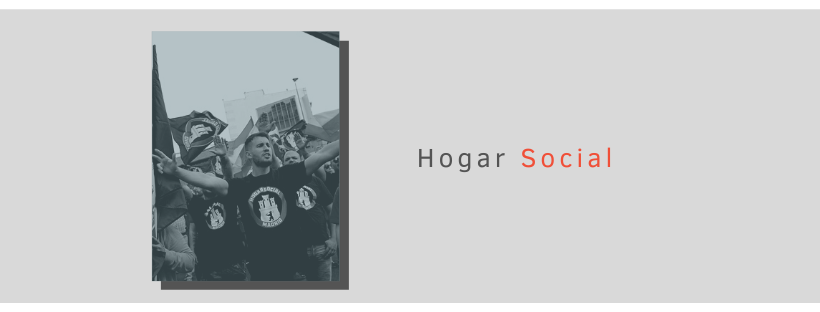
Factsheet: Hogar Social
IMPACT: Hogar Social is a right-wing Spanish social and political movement created in Madrid in 2014, now with chapters in other cities including Toledo, Granada, and Zaragoza. The movement’s leader, Melisa Domínguez Ruiz, previously worked in the right-wing political party Republican Social Movement (Movimiento Social Republicano, or MSR). Hogar Social members have expressed xenophobic sentiments, including linking crime and immigration. Muslims have been a particular target and in 2016, Hogar Social took part in a violent action against Madrid’s main mosque.
Hogar Social Madrid (HSM) is a far-right social and political movement that began in 2014 in Spain. Prior to 2014, the group was linked to the Movimiento Social Republicano, a political party, and to Liga Joven, a group of radical soccer/football supporters. Since 2017 Hogar Social has opened branches in Toledo, Granada, and Zaragoza. In 2019, Hogar Social registered as a political party. Hogar Social rejects the label of the “extreme right” and instead defines itself as “socialist,” and describes its agenda as “anti-globalisation, anti-capitalist and anti-establishment.”
Despite these labels, the members of Hogar Social consider themselves to be apolitical, proudly claiming Ramiro Ledesma, the Spanish politician and founder of Spanish fascism, as their inspiration. HSM claims to defends the interests of “the Spaniards” against the immigrants, especially Muslim immigrants. Every January second Hogar Social Granada celebrates the “Reconquista” of Granada as what they consider to be the liberation of Spain from the Muslims.
Melisa Domínguez Ruíz is the leader of Hogar Social. She was previously a member of the Movimiento Social Republicano and according to some sources has a swastika tattooed on her ankle. In 2009, she was convicted of assaulting a Latin American woman. In January 2019, the Madrid’s Prosecutor’s office called for a three-year prison sentence for Ruíz in connection with the 2016 attack on Madrid’s main Mosque.
On her personal Twitter account, Ruíz has both accused the Centro Cultural Islámico de Madrid of financing Islamic terrorism and claimed that North African Muslims were raping Spanish girls. Ruíz has also stated that Hitler “did some things right and some things wrong.” HSM members have been seen performing the Nazi salute at rallies. Ruíz has also suggested that society favored the celebration of Ramadan over Christian holidays such as Easter.
Hogar Social has associated itself with at least two similar organizations in other countries: the Greek Golden Dawn and the Italian Casa Pound. Regarding Golden Dawn, Ruíz acknowledges that HSM has emulated the Golden Dawn’s social action model. In a February 2017 interview, Ruíz stated, “We are more of Golden Dawn…They started by giving food to needy Greeks and they gained enough popular support to be the third political force. The main basis of Golden Dawn is social action.” This strategy had already been used in Spain by the extreme right during the economic crisis but has been used more extensively by Hogar Social during the COVID-19 pandemic. Hogar Social Madrid has focused on providing relief in the poorest neighborhoods of the city, such as Vallecas, Carabanchel, and Vicalvaro.
Emulating the Casa Pound model, Hogar Social has occupied emblematic buildings such as Banco Madrid (2017), Clinica Nuevo Parque (2020), and one of the headquarters of Televisión Española (2015) which is located opposite from the Israeli embassy.
In 2016, following the attacks by the Islamic State in Paris and Brussels, HSM carried out a series of violent actions. On March 22, 2016, a group of approximately thirty people threw grenades and smoke canisters at the Islamic Cultural Centre in Spain known as “the M-30 Mosque.” No one was injured. They then proceeded to a footbridge on the main Madrid ring road (M-30) and hung a banner there that read “Hoy Bruselas, Mañana Madrid” (Today Brussels, Tomorrow Madrid). Later, the following message was posted on the organization’s Facebook account: “First images of the action carried out a moment ago against Islamic terrorism in the M30 mosque in Madrid, a mosque that financed the Islamic State: MOSQUE OUT OF EUROPE.” Ruíz and ten others were tried for the violence and the prosecutor asked for three years’ imprisonment; the rest were acquitted.
On August 20, 2017, Hogar Social staged a similar attack on a mosque in the Albaicín quarter. The group unfurled a banner that read, “Whoever financed this mosque, finances terrorism, why are the authorities silent?”
Hogar Social Madrid has opened an online shop where people can currently purchase merchandise carrying the organization’s logo especially designed for young people, suggesting students may have become the new target for HSM recruitment. To this end, a new section has been created in the organization called, Núcleo Joven. This subgroup of HSM is present on university campuses and active on social media. This group has focused its actions on refugees, repeatedly describing them as terrorists. On its Twitter account, Núcleo Joven posted a message saying “Welcome Terrorists” in a clear allusion to the “Refugees Welcome” banner that had previously hung from the balcony of the Main Town Hall of the Municipality of Madrid.
HSM has also targeted Starbucks Coffee shops, accusing the company of hiring refugees instead of unemployed Spaniards. Hogar Social changed the original signs to ones that read, “Starburka Refugees,” to highlight Starbucks’ hiring policy.
Both Hogar Social Madrid and its branches in Toledo and Granada have been very active during the pandemic, distributing food to Spaniards in the poorest neighborhoods. During this period, Riay Tatay, the president of the Islamic Commission of Spain passed away as a result of COVID-19. The Ministry of Justice expressed its condolences through its Twitter account. In response, Hogar Social tweeted: “Why does a Muslim deserve more institutional tribute than our elders who raised our country in the most difficult times?”
This factsheet is published in collaboration between the Bridge Initiative and researchers and faculty at Universidad Pontificia Comillas and Universidad de Granada. More information about this project can be found here.
* a Spanish version of this factsheet can be found here
Last updated August 4, 2021

 Search
Search